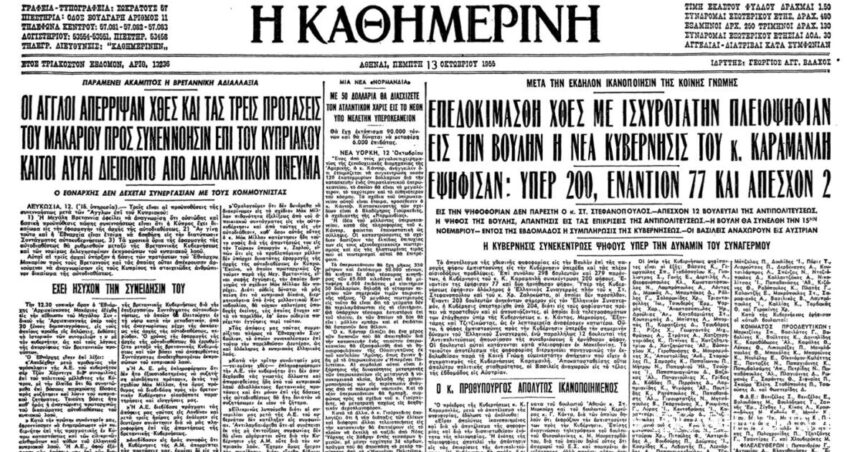The manifestation of the illness of the prime minister and leader of the Hellenic Alarm, Alexandros Papagos, in the spring of 1955 brought to light the issue of his succession. As Papagou’s health deteriorated, the reins of Greece’s administration passed to the two deputy prime ministers, Foreign Minister Stefanos Stephanopoulos and National Defense Minister Panagiotis Kanellopoulos, who were seen as the most likely candidates to succeed the ailing prime minister. Gradually, during the summer, it began to appear that the foreign minister would win the succession battle, even though new politicians, such as Panagis Papaligouras, Georgios Rallis and Konstantinos Karamanlis, had joined his opponent.
Konstantinos Karamanlis was considered a successful minister of the Papagou government, but he did not belong to the close circle of his collaborators. He gained pan-Hellenic prominence thanks to his remarkable work as Minister of Public Works and Communications. As early as March 1955, the name of Karamanlis began to appear in the press of the time as a possible successor to Papagos. As Karamanlis himself mentioned in his later testimony (Archive K. G. Karamanlis, vol. 1, p. 260), at the end of June he was approached by a courtier, who expressed King Paul’s concern about the situation that had developed after Papagos’ illness as well as his desire that “certain young people consider the possibility of creating successor government scheme”. About two months later, at the end of August, another courtier visited Karamanlis and informed him “that the king, convinced that the health of the prime minister was not going to be restored, was considering asking for his resignation in order to facilitate the appointment of a new Government and that was thinking of entrusting this effort to me”.
The collapse of the London Tripartite Conference on the Cyprus issue and the occurrence of the anti-Greek pogrom of the “Septembers” were seen inside the country as a personal failure of Stephanopoulos as Foreign Minister. It was a strong blow to his prestige. In September, Karamanlis seems to have started to distance himself from the collapsing government, expressing his disagreement with the handling of the Cypriot until then. Despite this, Karamanlis hesitated to openly claim the prime ministership while Papagos was still alive.
The death of Papagos, on October 4, left the position of prime minister vacant. The two obvious candidates for his succession appeared weakened: since September Kanellopoulos had an increasingly smaller role in the developments, while Stephanopoulos on the one hand did not have a broad popular support and on the other hand had suffered successive political defeats as a minister. A “third solution” was deemed necessary, which could be none other than Konstantinos Karamanlis, the representative of a new generation of politicians.
“Due to his decisive initiative, manifested yesterday evening, the King resolved the chaotic political situation created after the death of Marshal Papagos. Anax calls you at 8:30 p.m. yesterday Mr. Kon. Karamanlin, they gave him the mandate of forming the new Government. The royal mandate is also accompanied by an open authorization to dissolve the Parliament in a case in which it did not want to give a vote of confidence to the new Government, which will be sworn in today”, wrote “Kathimerini” on its front page on the 6her October 1955 commenting on the mandate to form a government, which the Macedonian politician received on October 5.
The first government of Constantinos Karamanlis received a vote of confidence from the Parliament on October 12. “Out of a total of 298 deputies and 279 present, the Government of Mr. K. Karamanlis collected 200 votes. 77 voted against it and two abstained. In favor of the Government, the entire Hellenic Alarm except for Mr. St. Stefanopoulos and Mr. Chr. Zalokostas, who did not attend”, reported “Kathimerini” among others the day after the vote.
It was a great victory for Karamanlis, not only because his government received the necessary vote from the majority of the Parliament, but also because he managed to keep the party united, a prospect that seemed very unlikely a few days earlier. Karamanlis announced the holding of national elections by the spring of 1956. As he noted (Archive K. G. Karamanlisvolume 1, p. 272), made this move “firstly, because after the death of Papagos, the political climate of the place was heavy; secondly, because the opposition had persistently demanded elections for a long time; thirdly, because I wanted to draw the authority directly from the people, so that I could exercise it effectively; and fourthly, because I wanted to benefit from the good impression created by my assumption of power among the people.”
Column Editor: Myrto Katsigera, Vassilis Minakakis, Antigone-Despina Poimenidou, Athanasios Syroplakis




